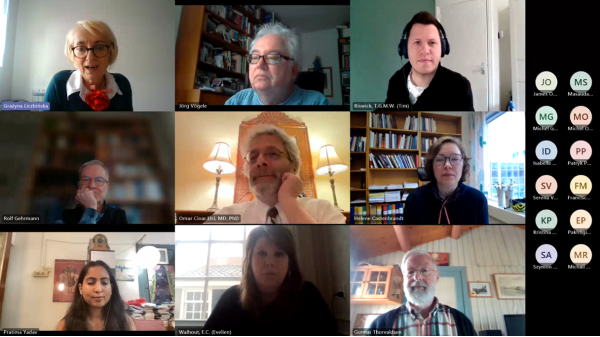Toward the Elimination of Cholera Epidemics: From the Past to Contemporary SocietiesVirtual workshop, 19 April 2024
The workshop "Toward the Elimination of Cholera Epidemics: From the Past to Contemporary Societies", organized by the IUSSP Scientific Panel on “Epidemics and Contagious Diseases: The Legacy of the Past” under the patronage of COST-Action "The Great Leap. Multidisciplinary approaches to health inequalities, 1800-2022" (www.greatleap.eu) took place on 19 April 2024, hosted virtually by Adam Mickiewicz University. The workshop was organized by Grażyna Liczbińska from the Faculty of Biology, Adam Mickiewicz, Poznań, Poland, and Jörg Vögele from the Department of History, Philosophy and Ethics of Medicine, Medical Faculty, Heinrich-Heine-University Düsseldorf, Germany.
The workshop included 4 sessions in which a total of 14 research papers were presented. The speakers were from Europe (Belgium, Croatia, Germany, the Netherlands, Norway, Romania, Slovakia, Spain, Sweden, and Switzerland), the United States, the Bahamas, South Africa, and India. A total of 40 people joined the workshop virtually.

The first session, titled "Cholera as a Challenge for Current Societies (20th–21st Century)" and chaired by Grażyna Liczbińska, began with a presentation by Michel Garenne from the University of the Western Cape, South Africa, in co-authorship with Oliver Fontaine (formerly at the World Health Organization). They presented their research findings on two cholera outbreaks in the 1980s in Niakhar, Senegal (West Africa). Following this, Omur Cinar Elci from Western Atlantic University School of Medicine, Freeport, Grand Bahama, emphasized the global public health threat posed by cholera, highlighting its escalating incidence in connection with the climate crisis. Emily Pakhtigian from Pennsylvania State University, USA, provided an overview of early warning cholera systems in Bangladesh, concluding that households with access to such applications feel better equipped to respond to environmental and health risks. Patrice Bourdelais from EHESS-Ecole des Hautes Études en Sciences Sociales, Paris, served as the discussant for this session.
The second session, focusing on demography and epidemiology in past societies, was chaired by Jörg Vögele. Rolf Gehrmann from Europa-Universität Viadrina Frankfurt (Oder), Germany, commenced the session with a study on the second cholera pandemic in the Eastern provinces of the Prussian Empire and its demographic impacts. Ján Golian from the University of Ss. Cyril and Methodius in Trnava, Slovakia, presented methods of recording cholera victims in church registers in 19th-century lands now part of Slovakia. Kaspar Staub and his team from the University of Zurich reconstructed the cholera epidemic of Basel in 1855 using geographic information visualization. Evelien Walhout from Leiden University, The Netherlands, analysed patterns of the 1866 cholera outbreak by sex, age, social class, and geographical location in two localities in the southwest part of the country. Francisco J. Garcia from the University of Zaragoza, Spain, and Víctor Antonio Luque de Haro from the University of Almería, Spain, demonstrated the impact of the 1885 cholera pandemic in the province of Zaragoza, particularly along the local river, shedding light on social inequalities in cholera-related mortality. Michel Oris from the Spanish Research Council, Institute of Economics, Geography, and Demography, Madrid, provided comments at the end of this session.
The last two sessions grouped papers on public health measures in selected countries, titled "Past: Public Health Measures (Part I and Part II)", again chaired by Grażyna Liczbińska and Jörg Vögele. Helene Castenbrandt from Lund University, Sweden, Kristina Puljizevic from the Catholic University of Croatia, Pratima Yadav from the Indian Institute of Technology (IIT) Madras, Chennai, India, and Lidia Trăușan-Matu and Octavian Buda from “Carol Davila” University of Medicine and Pharmacy in Bucharest, Romania, characterized preventive systems implemented in Sweden, Dalmatia, India, and Romania, respectively. Gunnar Thorvaldsen from UiT the Arctic University of Norway presented details about historical cholera epidemics, measures to limit them, and treatments. Isabelle Devos and her team from Ghent University compared the trajectory of the 1866 cholera epidemic in Antwerp and Brussels, then Belgium's largest cities. Tim Riswick from Radboud University, Nijmegen, provided comments for the third session, while Michail Raftakis from the University of Bologna, Italy, did so for the fourth session.
In summary, the workshop provided a platform for interdisciplinary research on cholera in both historical and contemporary contexts, involving historians, historical demographers, biologists, medical doctors, and cultural anthropologists. The event also discussed the broader cultural context related to cholera epidemics and explored strategies for combating cholera. Participants expressed interest in publishing the results in a conference volume.
|
